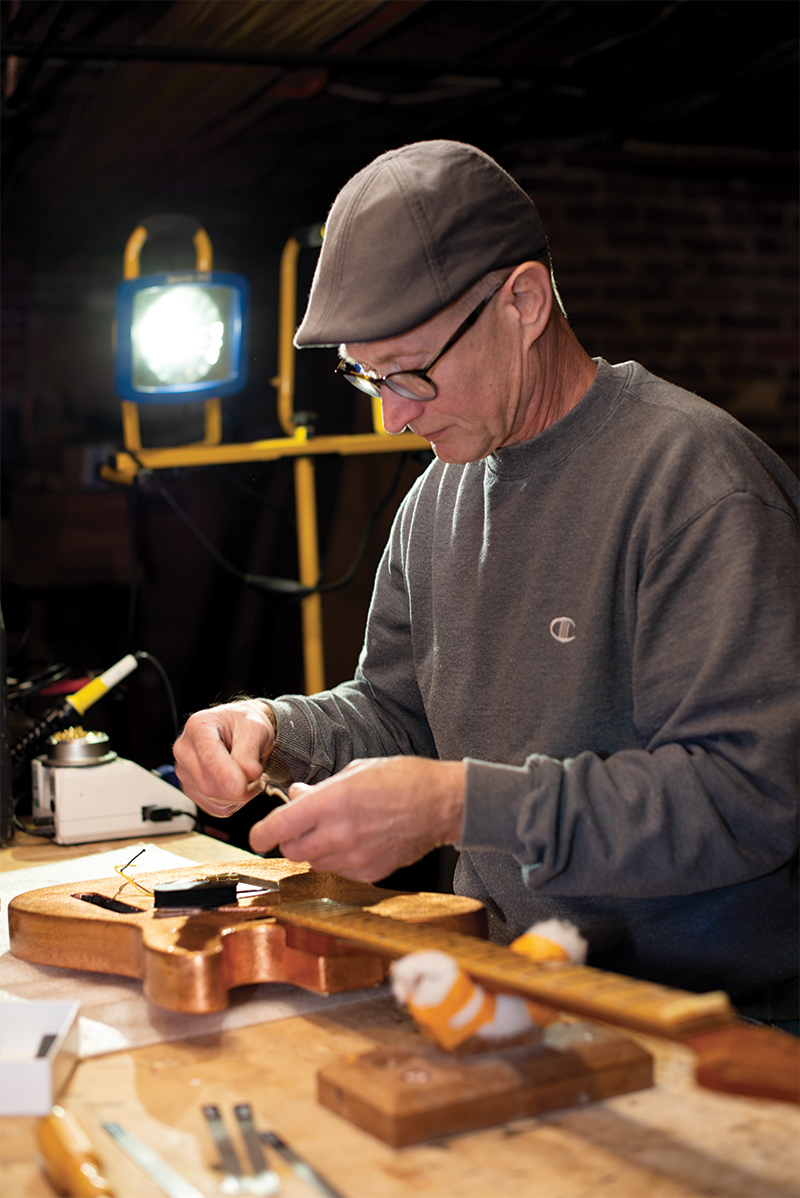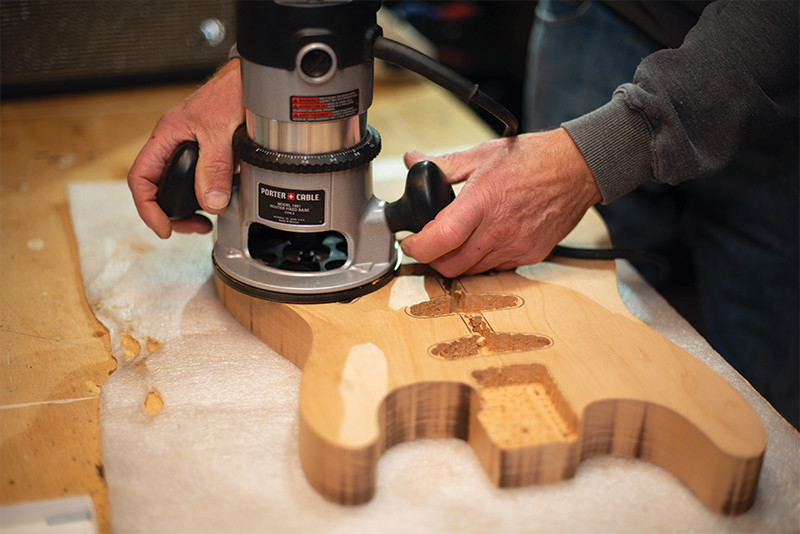If you’re at all familiar with the North Shore music scene, and even if you’re not, you’ve probably heard big, soaring notes taking flight from the guitar of Dave Drouin, front man for the award-winning band Cold Engines. Or the rockabilly strains of Chris Hersch, who plays monster lead guitar for the MoonRaiders and has been voted among the “Best Roots Guitar Players Nationwide.” Or the down-home country blues of Brad Faucher, first-call guitarist on Boston’s R&B and jazz fronts.
All of these sounds come from Randy Springis’s basement. In his shop at the bottom of a tall Victorian in Amesbury, he works his magic to create what he has dubbed Karge Guitars—custom instruments crafted to each client’s exact specifications rather than “off the rack” models that don’t speak to an artist’s particular needs for sound, resonance, aesthetics, and overall handling.

The name of the enterprise is an homage to his maternal grandparents, Harry and Naomi Karge (pronounced CAR-ghee). While Springis was growing up little more than a stone’s throw from the Iowa border in the little southern Minnesota town of Blue Earth, Harry taught him the virtues of a job well done with the right tools and an honest approach.
From what his clients have to say about him, he has inculcated those virtues in spades. Remarks Drouin, “I know when I bring my Karges to a gig, they’re going to deliver the highest echelon of guitar sound. They’re simply world-class instruments. Randy’s selection of components, the selection of wood, his attention to detail—the way he puts it all together really brings out the tone.”
Hersch gives Springis similarly high marks, not only for his work but also his approach. “Randy and I went back and forth with adjustments, like, eight times over a three-month period,” he says. “It was all very easygoing. He knew the kind of style I play, and I could go to him as many times as I needed at no extra charge.
“I had to have a very precise neck to pick up on intonation variables, and Randy got it to exactly where I wanted it. At high volumes the guitar tears the roof off the place more than my other guitars.
“It definitely gives me a sense of freedom,” Hersch adds. “And the wood is a Brazilian rosewood, which balances out the hot and heavy pickups that he has on there.”

Springis didn’t pick up his own first guitar until he was 23 and in the Marine Corps. And it took 20 more years after that for him to start playing seriously. But he was always frustrated with what was available. “You go to a guitar center and see mass-produced instruments on the wall, and they just don’t feel substantial,” he says. “They don’t have any soul.”
He finally decided to fix what was missing by taking the painstaking care he brings to his work as a master builder of period furniture reproductions (he trained at Boston’s North Bennet Street School, which teaches fine craftsmanship) and parlaying it into building artisanal guitars.
The acclaim for his expertise stretches far beyond the Boston area. Nashville-based country music star Chuck Ward says that “Randy puts the same love into every guitar, just like Leo [Fender, of the famed Fender guitar] did back in the day. Anything I want, he builds. They are just the finest instruments that I’ve played.”
Springis is currently building a Karge for Grammy Award winner Luther “Guitar Junior” Johnson, who appeared in the Belushi/Ackroyd flick The Blues Brothers. It has a neck shaft of curly maple set atop a body of swamp ash painted aged ocean turquoise with matching headstock. “The ash gives it a somewhat brighter sound than certain other woods,” Springis says. “Alder wood has a little more punch. It depends on what you’re after.”
It’s not just a better sound he’s after but also the way the instrument handles. His guitars are right around seven pounds rather than the typical eight or nine yet with all of the same resonance. And his generally thicker necks don’t create as much hand fatigue when the guitar is played over a long session; there’s something for the hand to rest on.

Karge guitars have an arresting visual aesthetic, too. Springis can get salvaged chestnut from old wood beams or rosewood, which is generally unavailable to the big-name makers because supplies are dwindling and it’s hard to order large batches. He goes to the lumberyards himself to choose woods individually. “I’m not going to say that I’m Zen with the wood,” as he puts it, “but having worked with wood for the last 25 years, I have a good sense of how it’s going to react when I cut it.”
He’s able to do it all for a starting price of around $2,600, whereas a mass-produced guitar costs about $2,000. It’s not a big difference for a serious guitar player.
First-call guitarist Faucher says that what you get can’t exactly be measured in money, anyway. “Randy puts his heart and soul into it,” he effuses. He takes what’s missing from production-line guitars and puts it back in—with hand tools, the old-fashioned way. He is as passionate about building the instrument as I am about playing it.”
For more information, visit kargeguitars.com.

